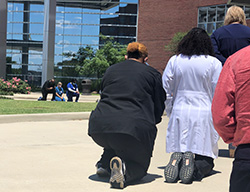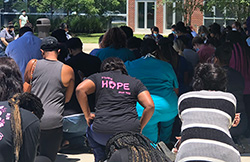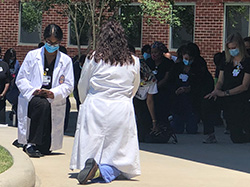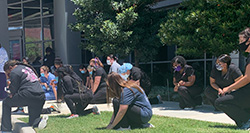At Woman’s Hospital, thousands of lives are ushered into our world every year. While we celebrate the joy of new life, we recognize that many of those whose lives we touch will experience the pain of inequality and injustice. As caregivers committed to reducing healthcare disparities, we must contribute to a future without racism by leading meaningful change in our workplace, our homes and our community.
On June 11th, Woman’s participated in a solidarity event to recognize that Black Lives Matter. This event was organized by Dr. Neelima Sukhavasi, OB-GYN at the LSU Health Science Center located at Woman’s Hospital.
Kneeling for Change
Author: Neelima Sukhavasi, MD, Obstetrics and Gynecology, Assistant Clinical Professor
As physicians, we take an oath to do no harm. We are taught to care for all of our patients with equal high standards, regardless of income, skin color, and background. However, we also learn about inequities in healthcare.
Almost every aspect of medicine shows that implicit bias and the social determinants of health, such as safe housing, access to quality education, and nutrition, are factors in black Americans having worse healthcare outcomes than white Americans. This holds true in our field of obstetrics as well since we know that black mothers in Louisiana are 3 to 4 times more likely to die than white mothers.
The COVID-19 global pandemic has affected many aspects of our lives, including making healthcare disparities and inequities in our country more visible than ever before. As LSU physicians, we take care of the women of Louisiana who are often the ones disproportionately affected by these healthcare disparities.
While we may not all be minorities or people of color, we wanted to show our colleagues, patients, and community, that we stand beside them in support of the Black Lives Matter movement against racial injustice, especially in these trying times.
We were inspired by the number of events taking place at hospital campuses across the country, and within a few days we were able to organize our own visible expression of solidarity on the Woman’s Hospital campus. It was amazing to see what we thought would be just a small group of like-minded individuals turn into a gathering of approximately 200 people from all parts of the Woman’s organization.
While 8 minutes and 46 seconds of kneeling together may not seem long, I believe that time brought us together and reminded us of the hardships many of our brothers and sisters of color encounter in their lives that we may not ever fully understand.





